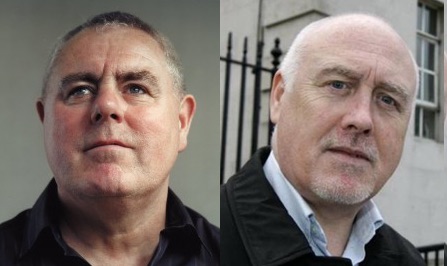
Recently released government papers dating from 1985 have again reopened a debate about negotiations which took place during the 1981 hunger strike which some have argued could have prevented the deaths of six of the ten republican prisoners who died.
Fresh details about the controversy have emerged with the release of previously secret state papers which show that British government officials discussed the existence of a back channel between the IRA and British government at the time.
The new information has now prompted author and former republican prisoner Richard O’Rawe (pictured, left) to call on Gerry Adams and former Sinn Fein director of publicity Danny Morrison (pictured, right) to apologise.
Details of the deal were mentioned in a memoir from British official Stephen Leach to Britain’s permanent secretary in the North, John Blelloch. Blelloch, who also worked as an MI5 agent, served as deputy secretary and a key adviser during the hunger strike.
In the memo Leach warned Blelloch that the author of a book about the hunger strike, Padraig O’Malley, wanted to ask him questions about the existence of an intermediary codenamed ‘Mountain Climber’.
He said: “During the second hunger strike in June/July 1981 ... the Irish Commission of Justice and Peace (ICJP) had some meetings with senior republican figures including Gerry Adams.
“Adams told them in confidence about the Mountain Climber and indicated that a ‘good offer’ had recently been received via this channel.”
When Blelloch proceded with the interview, which has since been published online, he contradicts this idea that there was a ‘good offer’. Questioned in 1986 by O’Malley on whether there was scope for an accommodation, Blelloch claimed there wasn’t, given the “gulf” between the Thatcher government’s position and the “five demands” of the prisoners.
Mr O’Rawe maintains that Gerry Adams and others outside the prison later rejected a potential deal, although Sinn Fein and Danny Morrison, who was involved in the hunger strike negotiations, have always denied there was any deal on offer.
The memo also states that after a period of inactivity the “Mountain Climber” was re-activated and on 19 July that he passed a ‘better offer’ which the republican leadership “wanted to accept”. A deal at that point could have saved the lives of four hunger strikers.
“However, the prisoners themselves refused to accept this offer without public assurances on certain points. These were not forthcoming and no compromise was therefore reached,” said Leach.
Mr O’Rawe disputes this, claiming that prisoners were not told about the second offer at the time and therefore were not in a position to reject it. He urged Mr Adams and Morrison to apologise to former hunger strikers and the families of those who died.
“In either case an apology is needed for the hunger strikers and their families and the wider community that suffered so greatly as a result of the hunger strike,” he said. “Let’s have a bit of humility after 35 years. It’s the decent thing to do.”
Mr O’Rawe said the declassified files, and previously released papers, support his version of events.
“The British were broke, the hunger strike broke the British,” he said. “Adams and Co. said more was needed and because they said that the whole thing collapsed and six more men died.”
Sinn Fein did not comment on the issue. A statement published anonymously on the Bobby Sands Trust website referred to the text of the interview given by Blelloch to Padraig O’Malley.
“Blelloch bluntly says ‘no’ to the question of whether there was scope for an accommodation, stating that there was too huge a gulf between the Thatcher government’s position and the prisoners’ demands,” the statement said.
The statement added: “In the interview, Blelloch rubbished such claims that the British government compromised or softened its position before the death of Joe McDonnell [on July 8, 1981]”
![[Irish Republican News]](https://republican-news.org/graphics/title_gifs/rn.gif)
![[Irish Republican News]](https://republican-news.org/graphics/title_gifs/harp.gif)

